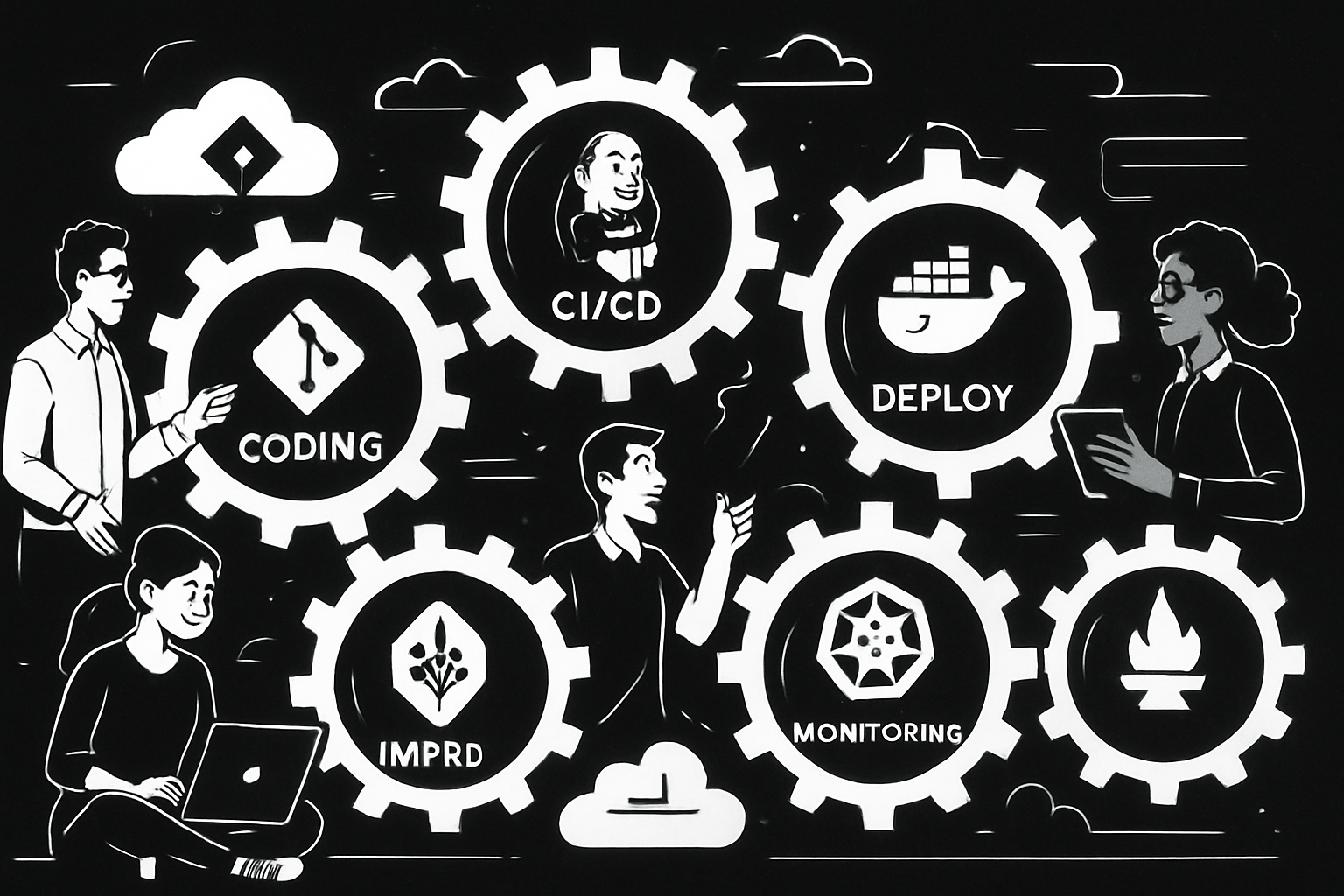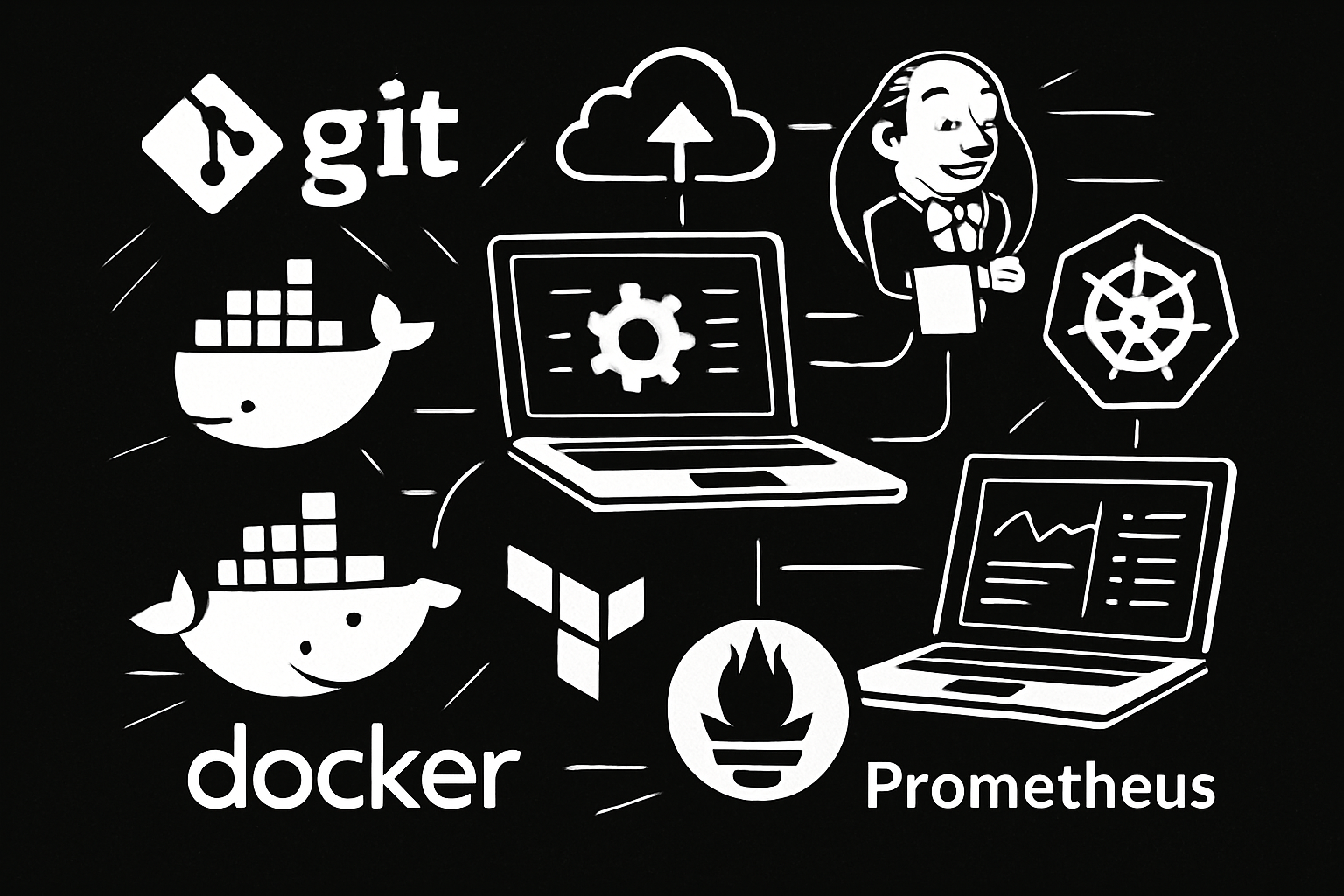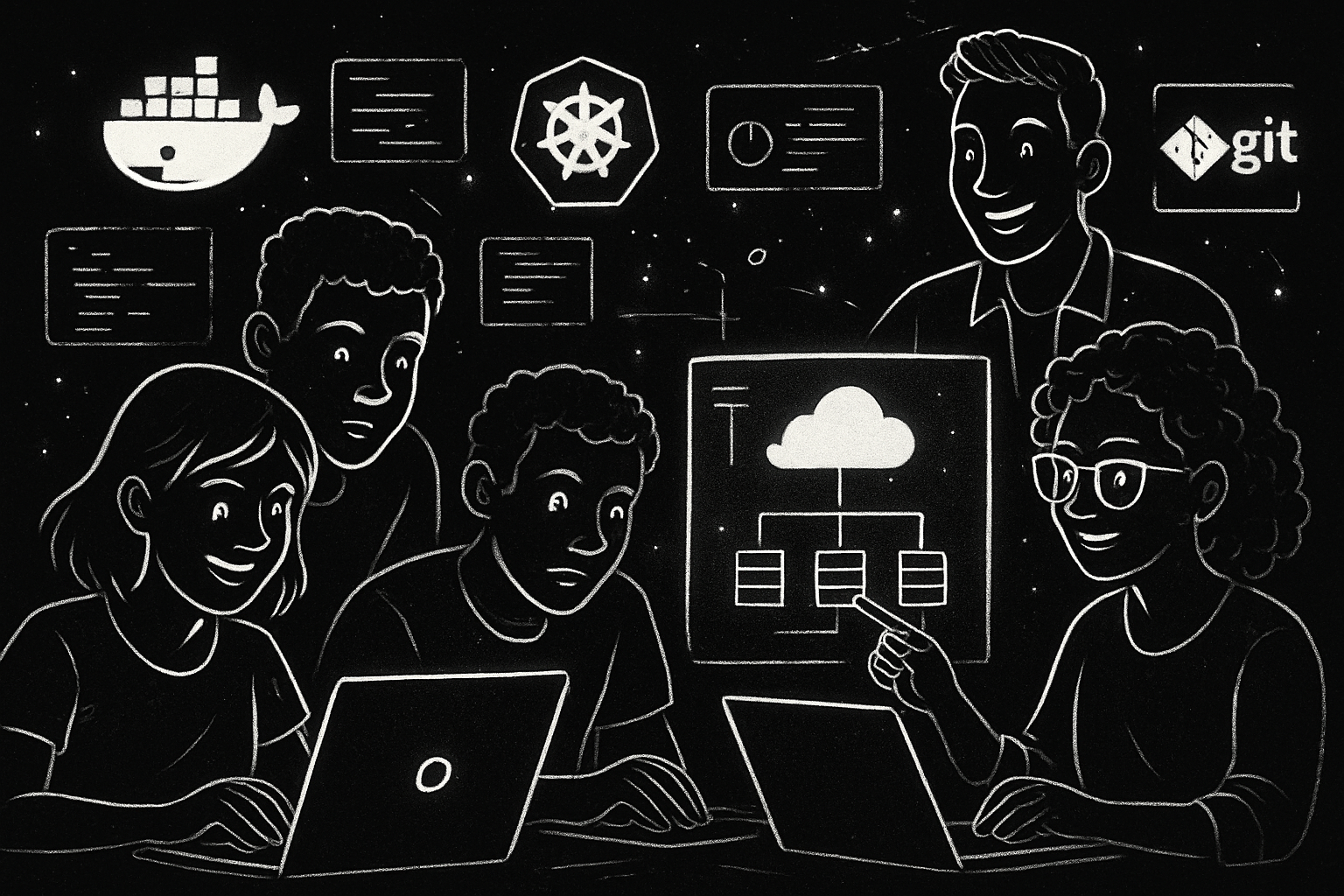Curious about how leading tech giants ship software at lightning speed, all while reducing risk and boosting reliability? The answer is devops engg—a dynamic field blending development and operations to transform how teams deliver innovation.
In this guide, we’ll break down devops engg for beginners, making complex ideas simple and actionable. You’ll discover key principles, essential tools, and the practical steps to launch your own journey in 2025.
Industry demand for devops engg is skyrocketing, offering exciting roles and strong career growth. Ready to unlock your potential? Let’s dive in and start your transformation.
What is DevOps Engineering?
Curious why tech giants like Netflix can roll out new features at lightning speed? The answer often lies in devops engg. This approach is more than a buzzword—it's a powerful combination of culture, processes, and tools that brings development and IT operations together.
 What is DevOps Engineering?
What is DevOps Engineering?
Defining DevOps Engineering
Devops engg is both a cultural and technical movement designed to bridge the gap between software development and IT operations. Its main goals are clear:
- Deliver software faster and more reliably
- Improve product quality
- Reduce failure rates and downtime
A devops engg professional acts as a connector, ensuring that code moves smoothly from development to deployment. These engineers automate repetitive tasks, streamline workflows, and foster strong collaboration across teams.
A real-world example? Netflix famously adopted devops engg practices to enable thousands of deployments per day. By doing so, they not only accelerate innovation but also maintain robust systems at scale.
If you want to dive deeper into real-world stories and practical tips, check out these DevOps Blog Articles and Insights for beginners.
Core Principles of DevOps
At the heart of devops engg are core principles that drive success:
- Collaboration: Breaking down silos between teams
- Automation: Replacing manual steps with scripts and tools
- Continuous Integration/Continuous Delivery (CI/CD): Ensuring code changes are tested and delivered rapidly
- Feedback Loops: Rapidly identifying and addressing issues
- Infrastructure as Code (IaC): Managing infrastructure with code for consistency and repeatability
- Monitoring and Proactive Response: Keeping systems healthy and quickly resolving incidents
Consider this: According to the 2023 State of DevOps Report, high-performing teams deploy 208 times more frequently than low performers. This statistic highlights how devops engg can transform productivity and reliability.
DevOps vs. Traditional IT Operations
How does devops engg differ from legacy IT approaches? The differences are significant—not just in tools but in mindset.
| Aspect | Traditional IT | DevOps Engg |
|---|---|---|
| Workflow | Sequential, siloed | Collaborative, agile |
| Responsibilities | Separate roles | Shared ownership |
| Change Frequency | Infrequent | Continuous |
| Failure Response | Reactive | Proactive |
Devops engg breaks down barriers, enabling rapid adaptation and tighter feedback loops. In contrast, traditional IT often struggles with slow releases and communication gaps. Modern organizations embracing devops engg are more agile and resilient.
The Evolution of DevOps in 2025
What’s next for devops engg? The field is evolving rapidly. Some top trends shaping 2025 include:
- AI and Machine Learning Integration: Automating incident response and predictive analytics
- GitOps: Managing infrastructure and deployments using Git workflows
- Platform Engineering: Building internal platforms for streamlined developer experience
- Cloud-Native Technologies: Leveraging containers and microservices to boost scalability
Kubernetes has become the industry standard for orchestrating containerized workloads, allowing devops engg teams to manage complex systems with ease. As organizations continue to adopt these innovations, devops engg is set to play an even bigger role in shaping the future of IT.
The DevOps Lifecycle: Key Stages Explained
Unlocking the full potential of devops engg starts with understanding its lifecycle. Each stage in this journey transforms how teams build, test, and ship software. Let’s break down every key phase, the essential tools, and real-world practices that power high-performing organizations.
 The DevOps Lifecycle: Key Stages Explained
The DevOps Lifecycle: Key Stages Explained
Planning and Collaboration
Every devops engg project starts with planning and collaboration. This phase defines goals, aligns stakeholders, and sets the groundwork for smooth delivery. Teams use tools like Jira, Trello, and Confluence to organize tasks and share knowledge.
- Define project scope and milestones
- Foster cross-functional communication
- Set up agile boards for visibility
Agile sprints are often combined with devops engg practices, enabling fast feedback and adaptive planning. For a deeper dive into professional lifecycle adoption, check out this DevOps Implementation Services Overview.
Coding and Building
Next, devops engg moves into coding and building. Developers manage code with Git, using platforms like GitHub or GitLab for version control. Code reviews and automated builds ensure quality from the start.
- Use branching strategies for collaboration
- Integrate Jenkins or GitHub Actions for builds
- Automate dependency management
According to Puppet’s 2023 report, 87% of devops engg teams rely on version control, making this phase a backbone of modern workflows.
Continuous Integration and Testing
Continuous integration (CI) and testing are vital in devops engg. Automated testing frameworks like Selenium and JUnit catch bugs early, while CI pipelines streamline the merging and validation of code.
- Set up CI pipelines for every commit
- Run automated unit and integration tests
- Enable rapid feedback for developers
For example, Google’s CI systems handle thousands of builds daily, ensuring reliability at scale. This phase reduces the risk of late-stage failures and speeds up delivery.
Deployment and Release Management
Deployment and release management are where devops engg truly shines. Automated pipelines push code changes to production with minimal downtime. Techniques like blue/green and canary deployments reduce risk.
- Automate releases with Spinnaker or ArgoCD
- Use feature flags for controlled rollouts
- Monitor performance during releases
By adopting these practices, teams can deploy updates quickly, ensuring users always have the latest features without disruption.
Monitoring and Feedback
Real-time monitoring is crucial in devops engg. Tools like Prometheus and Grafana track system health, while the ELK Stack captures detailed logs for troubleshooting.
- Set up dashboards for real-time visibility
- Configure alerts for incidents
- Conduct blameless postmortems after outages
DORA’s 2023 study found that automated monitoring enables teams to resolve incidents 50% faster. Feedback from this stage drives meaningful improvements.
Continuous Improvement
The devops engg lifecycle ends with continuous improvement. Teams hold retrospectives, analyze feedback, and optimize processes for future cycles.
- Review metrics and outcomes regularly
- Identify bottlenecks and remove waste
- Encourage a culture of learning
Etsy’s commitment to continuous delivery and feedback is a standout example, showing how constant iteration leads to innovation and resilience.
Essential DevOps Tools for Beginners
Starting your devops engg journey means getting hands-on with the right tools. The landscape is vast, but mastering a few essentials will set you up for success. Let’s break down the core categories every beginner should know.
 Essential DevOps Tools for Beginners
Essential DevOps Tools for Beginners
Version Control and Source Management
Version control is the backbone of devops engg. It lets teams collaborate, track changes, and safely roll back when needed. The most popular choice is Git.
- Git: Distributed version control system for code history.
- GitHub/GitLab: Cloud platforms for hosting repositories and enabling collaboration.
- Branching strategies: Feature, release, and hotfix branches help structure work.
A simple example for beginners:
git clone https://github.com/yourrepo.git
git checkout -b feature/awesome-feature
Mastering these basics ensures your devops engg projects are organized and team-friendly.
CI/CD Pipelines
Continuous Integration and Continuous Delivery (CI/CD) automate code building, testing, and deployment. This is a core practice in devops engg for delivering reliable software faster.
- Jenkins: Popular open-source automation server.
- CircleCI/GitHub Actions: Cloud-based pipeline solutions.
- Automate builds, run tests, and deploy with minimal manual effort.
CI/CD pipelines reduce errors and let teams focus on innovation. Learning to set up a pipeline is a must for devops engg success.
Containerization and Orchestration
Containers package applications and their dependencies, making them portable and consistent. In devops engg, Docker and Kubernetes are foundational.
- Docker: Build, ship, and run applications in containers.
- Kubernetes: Orchestrate and scale containers across clusters.
Statistic: 92% of organizations use containers in production (CNCF 2023).
Example Dockerfile:
FROM node:18
WORKDIR /app
COPY . .
RUN npm install
CMD ["npm", "start"]
With these tools, devops engg professionals can deploy anywhere with confidence.
Infrastructure as Code (IaC)
IaC automates infrastructure provisioning using code, a game-changer for devops engg. Tools like Terraform and AWS CloudFormation let you manage resources efficiently.
- Terraform: Write declarative configs for multi-cloud environments.
- AWS CloudFormation: Define AWS resources as code for repeatability.
IaC boosts consistency and speeds up infrastructure changes. For devops engg beginners, learning basic scripts can unlock powerful automation.
Monitoring and Logging
Modern devops engg requires visibility into systems. Monitoring and logging tools help detect, diagnose, and resolve issues quickly.
- Prometheus: Open-source monitoring with powerful querying.
- ELK Stack: Elasticsearch, Logstash, Kibana—collect and visualize logs.
- Set up alerts and dashboards for proactive insights.
To see how automation and AI-driven observability are transforming incident management in devops engg, check out AWS DevOps Guru and AI Observability.
Security and Compliance Tools
Devops engg integrates security from the start—known as DevSecOps. Scanning for vulnerabilities and ensuring compliance is essential.
- Snyk: Finds vulnerabilities in code and dependencies.
- Aqua Security: Protects containerized environments.
- Security checks: Automate scans in CI/CD pipelines.
Embedding these tools makes devops engg workflows safer and more robust.
Collaboration and Communication
Effective teamwork is the secret ingredient of devops engg. Collaboration platforms keep everyone aligned, especially for remote teams.
- Slack: Real-time messaging and integrations.
- Microsoft Teams: Video calls and team channels.
- ChatOps: Automate tasks via chat for instant feedback.
Devops engg thrives when communication is seamless and transparent.
Step-by-Step Guide: How to Start Your DevOps Journey in 2025
Ready to begin your devops engg journey? Whether you’re a coding newbie or an IT pro aiming to level up, following a clear roadmap is the key to success. Let’s break down the essential steps to help you become a confident devops engg practitioner in 2025.
 Step-by-Step Guide: How to Start Your DevOps Journey in 2025
Step-by-Step Guide: How to Start Your DevOps Journey in 2025
Step 1: Learn the Fundamentals
Every devops engg path begins with the basics. Mastering Linux, scripting, and networking will make everything else easier. Start by getting comfortable with the command line. Learn to navigate directories, manage files, and run shell scripts.
Key areas to focus on:
- Linux basics: File permissions, processes, networking commands.
- Scripting: Bash or Python for automation.
- Networking: Understanding TCP/IP, DNS, firewalls.
Free resources like freeCodeCamp and Coursera offer beginner-friendly courses. Explore official documentation for in-depth knowledge. Grasping these fundamentals is crucial for any devops engg role.
Step 2: Master Version Control
Version control is the backbone of devops engg. Begin with Git, the industry standard. Install Git, create repositories, and experiment with branching and merging.
Try this workflow:
git initto start a new project.git add .andgit commit -m "Initial commit"to track changes.- Create a new branch:
git checkout -b feature-branch. - Merge changes back into the main branch.
A practical milestone is making your first open-source contribution. This hands-on experience builds confidence and showcases your devops engg skills to future employers.
Step 3: Explore Automation and CI/CD
Automation is at the heart of devops engg. Start by writing simple build scripts to automate repetitive tasks. Next, create your first Continuous Integration (CI) pipeline using GitHub Actions or Jenkins.
Example: Set up a GitHub Actions workflow that runs tests automatically when you push code. This ensures bugs are caught early and code quality remains high.
Automation isn’t just a buzzword in devops engg—it’s how you save time and reduce errors. As you grow, explore more advanced pipelines for deployment and integration.
Step 4: Dive into Containers and Orchestration
Containers are essential for modern devops engg workflows. Begin with Docker to package your applications and their dependencies. Build an image with a simple Dockerfile, then run it locally.
Steps to try:
- Install Docker and run
docker run hello-world. - Write a
Dockerfilefor a basic web app. - Build and run your app in a container.
Once comfortable, move on to Kubernetes. Use Minikube to deploy your first app cluster. Orchestration skills set you apart in devops engg roles.
Step 5: Practice Infrastructure as Code
Infrastructure as Code (IaC) empowers devops engg professionals to automate cloud resource provisioning. Start with Terraform or AWS CloudFormation.
Try this:
resource "aws_instance" "web" {
ami = "ami-0c55b159cbfafe1f0"
instance_type = "t2.micro"
}
Deploy a simple web server on AWS using IaC. This approach ensures consistency and repeatability, which are vital in devops engg projects.
Step 6: Implement Monitoring and Logging
A core part of devops engg is monitoring applications and infrastructure. Set up Prometheus to collect metrics, and use Grafana to visualize them. Create dashboards to track performance and uptime.
Don’t forget alerting. Set up rules to get notified of issues before they impact users. Logging tools like the ELK Stack (Elasticsearch, Logstash, Kibana) help you troubleshoot efficiently.
Monitoring and logging keep your devops engg environment healthy and reliable.
Step 7: Embrace Continuous Learning and Community
The devops engg landscape evolves rapidly. Join online communities, such as the DevOps Subreddit or CNCF Slack, to stay updated. Participate in hackathons and open-source projects for hands-on experience.
According to GitLab, 68% of devops engg professionals attribute career growth to community involvement. Stay ahead by following Top DevOps Trends 2025 and connecting with peers who share your passion.
Continuous learning ensures your devops engg skills remain sharp and future-proof.
Real-World Applications and Career Opportunities in DevOps Engg
Curious where devops engg skills are applied in the real world? Let’s explore how these practices power industries, shape job roles, and drive career growth—plus the challenges and opportunities ahead.
DevOps in Different Industries
Devops engg is a game-changer across sectors. In e-commerce, giants like Amazon use DevOps to streamline releases and handle seasonal traffic spikes. In finance, leading firms such as Goldman Sachs rely on automated testing and rapid deployments to ensure compliance and reliability. Healthcare providers like Epic Systems leverage devops engg for secure data handling and faster delivery of new features.
By breaking down silos, devops engg accelerates digital transformation. Companies can adopt new technologies quicker, respond to market demands, and improve customer experiences. This cross-industry adoption makes devops engg a sought-after expertise.
Common DevOps Roles and Responsibilities
The devops engg field offers diverse career paths tailored to technical interests. Key roles include:
- DevOps Engineer: Focuses on automation, CI/CD pipelines, and infrastructure.
- Site Reliability Engineer (SRE): Blends software engineering with operations to keep systems reliable. Learn more about the SRE career path and best practices from SRE Services and Best Practices.
- Platform Engineer: Builds internal tools and cloud platforms for developer efficiency.
Daily tasks range from automating deployments to monitoring system health. Essential skills include scripting, cloud platforms, and collaboration.
Salary Trends and Job Market Outlook
Devops engg professionals are in high demand. In 2025, average salaries range from $110,000 to $160,000, with senior roles commanding higher pay. Certified experts in AWS, GCP, or Azure are especially sought-after.
According to industry forecasts, the future of DevOps is bright, with trends like AI integration and platform engineering shaping new roles. For more on emerging trends and predictions, check out the Future of DevOps.
| Role | Salary Range (2025) |
|---|---|
| DevOps Engineer | $110,000–$150,000 |
| SRE | $120,000–$160,000 |
| Platform Engineer | $115,000–$155,000 |
Required Certifications and Learning Paths
Certifications give devops engg candidates a competitive edge. Popular options:
- AWS Certified DevOps Engineer
- Google Professional DevOps Engineer
- Microsoft Azure DevOps Engineer
Many choose online bootcamps and hands-on labs to build practical skills. Recommended resources include official documentation, Coursera, and project-based learning.
Challenges and Solutions in DevOps Adoption
Adopting devops engg isn’t always smooth. Common hurdles include tool sprawl—managing too many platforms—and cultural resistance to change. The solution? Secure executive buy-in, start with small teams, and grow success incrementally.
Spotify’s squad model is a prime example. By empowering autonomous teams, they scaled devops engg practices across the organization, balancing innovation with reliability.
Teqnisys: Expert DevOps and Cloud Consulting for Modern Enterprises
Teqnisys is a leader in devops engg consulting. They specialize in AWS and Google Cloud solutions, helping clients automate infrastructure, ensure security, and optimize costs. With over 100 successful cloud migrations and a 99.99% uptime record, Teqnisys delivers tailored CI/CD implementations and infrastructure as code.
Organizations can benefit from a free initial consultation to modernize and scale their devops engg practices with confidence.
If you’re excited to start your DevOps journey but not sure where to take the next step, you’re not alone—we’ve all been there! Whether you want help mapping out your learning path, understanding career options, or figuring out which tools to focus on, sometimes a little expert guidance makes all the difference. At Teqnisys, our certified cloud consultants have helped beginners just like you turn curiosity into confidence and real-world results. If you’d like to chat about your goals or get personalized advice, you can Book 15min discovery call—no pressure, just a friendly conversation to help you move forward.
